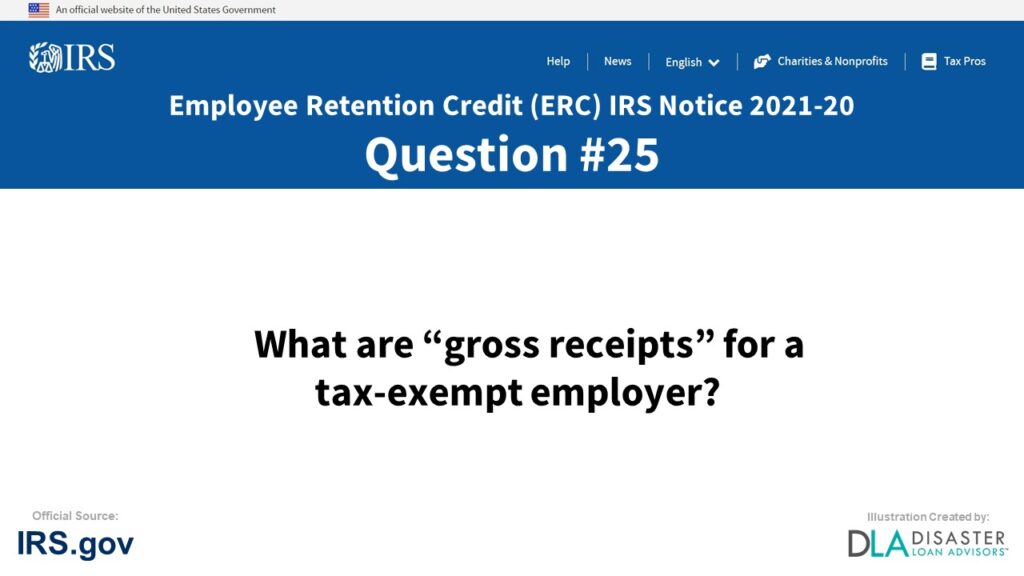
Question #25:
What are “gross receipts” for a tax-exempt employer?
Found under the E. Significant Decline in Gross Receipts section of the Employee Retention Credit (ERC) IRS Notice 2021-20 with updated guidance to help business owners follow the current ERC rules.
The answer to question #25, What are “gross receipts” for a tax-exempt employer?, can be found below.
ERC IRS Notice 2021-20 Question #25:
E. Significant Decline in Gross Receipts
What are “gross receipts” for a tax-exempt employer?
“Gross receipts” for purposes of the employee retention credit, for a tax-exempt organization, has the same meaning as under section 6033 of the Code. Under the section 6033 regulations, “gross receipts” means the gross amount received by the organization from all sources without reduction for any costs or expenses including, for example, cost of goods or assets sold, cost of operations, or expenses of earning, raising, or collecting such amounts. Thus, gross receipts includes, but is not limited to, the gross amount received as contributions, gifts, grants, and similar amounts without reduction for the expenses of raising and collecting such amounts, the gross amount received as dues or assessments from members or affiliated organizations without reduction for expenses attributable to the receipt of such amounts, gross sales or receipts from business activities (including business activities unrelated to the purpose for which the organization qualifies for exemption), the gross amount received from the sale of assets without reduction for cost or other basis and expenses of sale, and the gross amount received as investment income, such as interest, dividends, rents, and royalties.
To determine whether there has been a significant decline in gross receipts, a tax-exempt employer computes its gross receipts received from all of its operations during the calendar quarter and compares those gross receipts to the gross receipts received for the same calendar quarter in 2019.
For more information about the Employee Retention Credit (ERC) IRS Notice 2021-20, visit the Internal Revenue Service (IRS) Department of the Treasury, official IRS.gov tax website.
Conclusion and Summary on What are “gross receipts” for a tax-exempt employer? – #25 ERC IRS Notice 2021-20
The answer to Question #25: “What are “gross receipts” for a tax-exempt employer?” was answered in detail above. It was found under section “E. Significant Decline in Gross Receipts” in IRS Notice 2021-20.
Leave a comment below if you have further questions on the Employee Retention Credit (ERC) or for clarifications on What are “gross receipts” for a tax-exempt employer?
Employee Retention Tax Credit (ERTC): Expert Assistance to Claim Your Business ERC Credit
Up to a $26,000 ERC Refund from the IRS for Each Employee
Disaster Loan Advisors can assist your business with the complex and confusing Employee Retention Credit (ERC), Form 941-X, and the Employee Retention Tax Credit (ERTC) program.
Depending on eligibility, business owners and companies can receive up to $26,000 per employee based on the number of W2 employees you had on the payroll in 2020 and 2021.
The ERC / ERTC Tax Credit Program is a valuable IRS tax credit you can claim. This is money you have already paid to the IRS in payroll taxes for your W2 employees.
We DO NOT charge a percentage (%) of your ERC Refund like some companies are charging. Some ERC firms out there are charging upwards of 15% to 35% of your ERC refund!
Our professional ERC fee and pricing structure is very reasonable in comparison.
If you are looking for an ERC Company that believes in providing professional ERC Services and value, in exchange for a fair, reasonable, and ethical fee for the amount of work required, Disaster Loan Advisors is a good fit for you.
Schedule Your Free Employee Retention Credit Consultation to see what amount of employee retention tax credit your company qualifies for.
Cover Image Credit: Irs.gov / IRS Notice 2021-20 / Disaster Loan Advisors.
